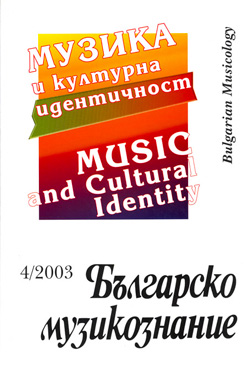Аспекти на модерната българска културна идентичност
Aspects of Modem Bulgarian Cultural Identity
Author(s): Maria Boyadjieva-LuizovaSubject(s): Music
Published by: Институт за изследване на изкуствата, Българска академия на науките
Summary/Abstract: In historical perspective the first version of modem Bulgarian cultural identity determines Bulgarian individualism as “the only universalistic indoctrination” in defence of the individuality of Bulgarian culture; the individualism of Pencho Slaveykov became the symbol of a phenomenon in Bulgarian culture; the synthesis of the “spiritual tradition in life’’, “the conscious synthesis of the independent, rationally-accepting the world, creative personality”, changes the cultural realities of the “national” and the “foreign”, of the “native” and the “European”. The image, combining “the person in the Bulgarian”, created by Pencho Slaveykov, lays the new universal humanistic principle in the identification of the Bulgarian and shows the potential of the cultural-construction pathos, which turns a look at European art and attracts it as building material for the universal. “The Europe-ism” of Pancho Vladigerov can be accepted as a remote reflection of the “imaginary spaces of the spiritual”, but he is much more an individual strategy for “drawing closer to” European music, which is Music, a principle of self-construction and, last but not least, an expression of a modern aesthetic and artistic universalism. And in the context of the 1920s, one of the many, but still not articulated manifestations of the “European” as an aspect of modern Bulgarian cultural identity.In historical perspective the first version of modem Bulgarian cultural identity determines Bulgarian individualism as “the only universalistic indoctrination” in defence of the individuality of Bulgarian culture; the individualism of Pencho Slaveykov became the symbol of a phenomenon in Bulgarian culture; the synthesis of the “spiritual tradition in life’’, “the conscious synthesis of the independent, rationally-accepting the world, creative personality”, changes the cultural realities of the “national” and the “foreign”, of the “native” and the “European”. The image, combining “the person in the Bulgarian”, created by Pencho Slaveykov, lays the new universal humanistic principle in the identification of the Bulgarian and shows the potential of the cultural-construction pathos, which turns a look at European art and attracts it as building material for the universal. “The Europe-ism” of Pancho Vladigerov can be accepted as a remote reflection of the “imaginary spaces of the spiritual”, but he is much more an individual strategy for “drawing closer to” European music, which is Music, a principle of self-construction and, last but not least, an expression of a modern aesthetic and artistic universalism. And in the context of the 1920s, one of the many, but still not articulated manifestations of the “European” as an aspect of modern Bulgarian cultural identity.
Journal: Българско музикознание
- Issue Year: 2003
- Issue No: 4
- Page Range: 215-220
- Page Count: 6
- Content File-PDF

